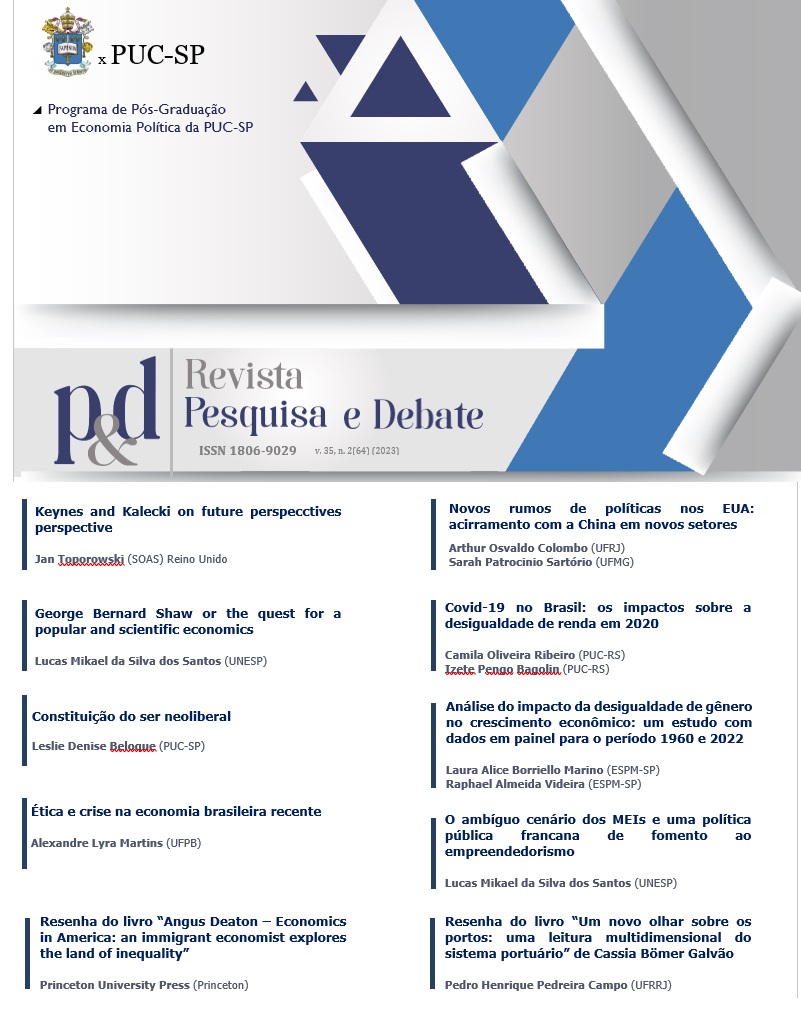George Bernard Shaw ou a busca por uma economia popular e científica
DOI:
https://doi.org/10.23925/1806-9029.35in.2(64)e64885Palabras clave:
Socialismo, Sociedade Fabiana, George Bernard Shaw, Philip Wicksteed, Teoria do valorResumen
George Bernard Shaw foi um importante teatrólogo irlandês do final do século XIX. Além de sua produção literária, que lhe rendeu o Prêmio Nobel de Literatura em 1925, Bernard foi também um importante militante socialista, ligado à Sociedade Fabiana. Como militante fabiano, Shaw aprofundou seus estudos em economia, tendo se envolvido em uma polêmica com o reverendo, e também estudioso da economia, Philip Wicksteed, sobre a teoria do valor. Este artigo tem como objetivo analisar esta polêmica e está dividido em três seções: a primeira descreve a formação do pensamento econômica de George Bernard Shaw; a segunda analisa a formação do pensamento econômico de Philip Wicksteed; e a terceira analisa o conteúdo propriamente da polêmica entre os dois. A conclusão do artigo aponta para a abordagem criativa de Bernard Shaw, mas também seus limites, ao justapor elementos do pensamento econômico marxista e neoclássico, sem alcançar uma síntese precisa de ambos.
Citas
ALISSON, Mark. Imagining Socialism Aesthetics, Anti-politics, and Literature in Britain, 1817–1918. Oxford. Oxford University Press, 2021.
AMINI, Babak. A Brief History Of The Dissemination And Reception Of Karl Marx’s Capital In The United States And Britain, World Review of Political Economy Vol. 7 No. 3 Fall 2016, pp. 334-349.
BEVIR, Mark. The Making of British Socialism. Princeton: Princeton University Press, 2011.
CLAYES, Gregory. Non-Marxian socialism 1815–1914. In: JONES, Gareth Stedman; CJAYES, Gregory (ed.). The Cambridge History Of Nineteenth-Century Political Thought. Cambridge: University of Cambridge Press, 2011, pp. 521-555.
DE VIVO, Giancarlo. Marx, Jevons, and Early Fabian Socialism. In: Political Economy Studies in the Surplus Approach, Vol. 3, No. 1, 1987, pp. 37-62.
ENGELS, Friedrich. Synopsis of volume one of capital by Karl Marx. In Marx, Karl; Engels, Friedrich. Marx-Engels Collected Works. Vol. 20. London: Lawrence & Wishart, 1985, pp. 263-310.
FLATAU, Paul. Jevons’s One Great Disciple: Wicksteed and the Jevonian Revolution in the Second Generation, History of Economics Review, Vol. 40; No. 1, 2004, pp. 69-107.
GIBBS, A. M. A Bernard Shaw Chronology. London: Palgrave, 2001.
HARRISON, Roy den. The Life and Times of Sidney and Beatrice Webb - 1858-1905: The Formative Years. London: Palgrave, 2000.
HINLEY, Susan. Charlotte Wilson, the ‘‘Woman Question’’, and the Meanings of Anarchist Socialism in Late Victorian Radicalism, IRSH, Vol. 57, No. 1, 2012, pp. 3-36.
HOBSBAWM, Eric. Labouring men. New York: Anchor Books, 1967.
HOWSON, Susan. Lionel Robbins. Cambridge: Cambridge University Press, 2011.
HYNDMAN, Henry Mayers. The record of an adventurous life. London: Macmillan, 1911.
JEVONS, William Stanley. Theory of Political Economy. London: Macmillan, 1911.
JONES, Gareth Stedman; CLAYES, Gregory (ed.). The Cambridge History of Nineteenth-Century Political Thought. Cambridge: University of Cambridge Press, 2011.
LÖWY, Michael; SAYRE, Robert. Romanticism Against the Tide of Modernity. Durham: Duke University Press, 2001.
MARX, Karl. Capital. Vol 1. London: Penguin, 1982.
MIROWSKI, Philip. Physics and the 'marginalist revolution', Cambridge Journal of Economics, December 1984, Vol. 8, No. 4, pp. 361-379.
NEWTON, Bernard. The Impact of Henry George on British Economists, American Journal of Economics and Sociology, 1971, v. 30, pp. 179-186.
POUSSON, Guilhem. Tolstoj, Nexljudov et l’impôt unique de Henry George, Revue des études slaves, v. 92, n. 2, 2021.
RICARDO, David. The Principles of Political Economy and Taxation. London: J. M. Dent & Sons Ltd., 1911.
ROBBINS, Lionel. Introduction. In: WICKSTEED, Philip. The Commonsense of Political Economy. Vol. 1. London: Routledge & Kegan Paul Limited, 1933, pp. V - XXVIII.
ROBBINS, Lionel. Economic Science and Political Economy. London: Macmillan, 1997.
RUSKIN, John. The political economy of art. Or “a joy for ever”. London: Cassel’s National Library, 1907.
RUSKIN, John; Unto this last. London: E. P. Dutton and Company, 1921.
SHAW, Bernard. A manifesto. Fabian Tract 2. London, 1884.
SHAW, Bernard. The Fabian Society: its early history. Fabian Tract 41. London, 1895.
SHAW, Bernard. On the History of Fabian Economics. In: Pease, Edward. The History of the Fabian Society. New York: E. P. Dutton & Company Publishers, 1916, pp. 253-280.
SHAW, Bernard. The Jevonian criticism of Marx. In: Wicksteed, Philip. The Commonsense of Political Economy. Vol. 2. London: Routledge & Kegan Paul Limited, 1933, pp. 724-730
SHAW, Bernard. Sixteen self sketches. London: Constable and Company, 1949.
SHAW, Bernard. Morris as I knew him. In: Morris, May. William Morris: Artist, Writer, Socialist. Vol. 2. Cambridge: Cambridge University Press, 2012a, pp. IX-XL.
SHAW, Bernard. The Intelligent Woman’s Guide to Socialism, Capitalism, Sovietism and Fascism. London: Alma Classics, 2012b.
SHAW, Bernard (ed.). Fabian Essays. London: The Garden City Press, 1948.
STEEDMAN, Ian. Wicksteed: Economist and Prophet. In: Brennan, H. Geoffrey; Waterman, A. M. C. Economics and religion: are they distinct? New York: Springer, 1994, pp. 77-122.
STEEDMAN, Ian. Introduction. In: Steedman, Ian (ed.). Collected Works of Philip Henry Wicksteed. London: Overstone, 1999, pp. I - XIII.
STOKES, E. E. Bernard Shaw and Economics. In: The Southwestern Social Science Quarterly, December 1958, Vol. 39, No. 3, pp. 242-248.
TOLSTOY, Leo. Last Steps: The Late Writings of Leo Tolstoy. London: Penguin, 2009.
WALLAS, Graham. The organization of society. In: Shaw, Bernard (ed.). Fabian Essays. London: The Garden City Press, 1948, pp. 165-212.
WHITE, Michael V.: Searching for New Jerusalems: P.H. Wicksteed’s “Jevonian” critique of Marx’s Capital, The European Journal of the History of Economic Thought, 2018, DOI: 10.1080/09672567.2018.1523938
WICKSTEED, Philip. ‘Fabian essays in socialism’, The Inquirer, August 16, 1890, pp. 530-31.
WICKSTEED, Philip. The Commonsense of Political Economy. Vol. 2. London: Routledge & Kegan Paul Limited, 1933.
WILLIAMS, Raymond. Culture and society: 1780-1950. New York: Anchor Books, 1960.
WILLIS, Kirk. The Introduction and Critical Reception of Marxist Thought in Britain, 1850-1900. The Historical Journal, Vol. 20, No. 2, 1977, pp. 417-459.



